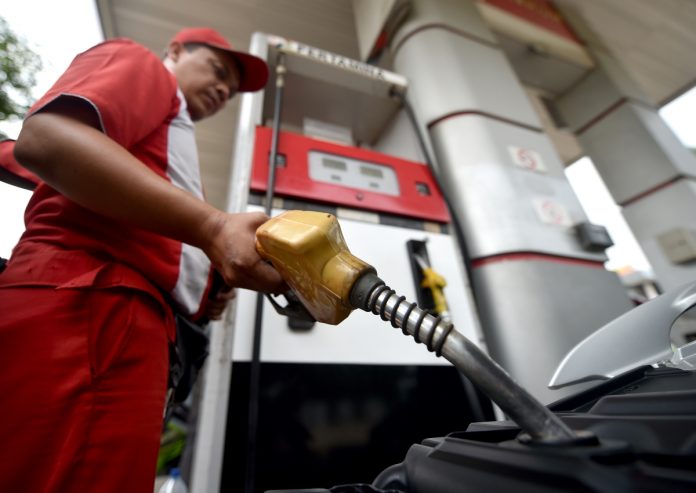
MANILA – The second round of increases in fuel excise taxes scheduled in January 2019 should be suspended to arrest the impact of skyrocketing prices of commodities, which hit a fresh nine-year high last month, economists said.
Inflation accelerated further to 6.7 percent in September from 6.4 percent in August weighed by the price increases in food items and fuels.
Last month’s inflation print is also a fresh nine-year high, its fastest since February 2009 when it came in at 7.2 percent.
“In my opinion, there is a need to look into ‘suspending’ the excise tax stipulation of TRAIN 1, not the entire TRAIN 1 as fuel cost affect most prices of major commodities,” independent economic consultant John Paolo Rivera told GMA News Online.
“The thing is, gasoline companies simply pass the tax burden to the people… despite the increase in take home pay, the additional tax burden is passed to consumers,” Rivera said.
The Tax Reform for Acceleration and Inclusion (TRAIN) law imposed an excise tax of P2.50 per liter on diesel and raised the levy on gasoline to P7 from P4.35 per liter.
The excise tax rate on diesel will go up to P4.50 next year and P6 per liter come 2020. For gasoline, the levy will go up to P9 in 2019 and P10 in 2020.
The TRAIN, however, has a pertinent provision on the suspension of fuel excise taxes.
The law says that the scheduled increase in the excise tax on fuel shall be suspended when the average Dubai crude oil price based on Mean of Platts Singapore (MOPS) for three months prior to the scheduled increase of the month reaches or exceeds $80 per barrel.
Likewise, University of Asia and the Pacific School of Economics dean Cid Terosa also suggested that the government should “perhaps suspend the implementation of indirect tax hikes.”
The Department of Finance has earlier said that it will be ready to activate the suspension mechanism for the next increase in January 2019 should the price of Dubai crude keep going up and the three-month average in the last quarter of this year hits $80 per barrel.
Inflation affects poor the most
The faster rate of increases in the prices of goods and services means weaker purchasing power, especially for the poor, according to economists.
“Inflation cuts the purchasing power of the poor, reduces their options, and hurts their economic welfare,” Terosa said.
For his part, Rivera said the poor are greatly affected by the high inflation rate as the items hit by inflation are food items, which are 60 to 70 percent of their household budget,” Rivera said.
Data from the Philippine Statistics Authority showed that food inflation hit 9.7 percent, the highest since March 2009.
“Higher inflation/prices tend to reduce the purchasing power and spending of households/consumers, which account for about 70 percent of the local economy, thereby could lead to slower growth in demand for affected goods and services, as well as slower growth in the broader economy,” Rizal Commercial Banking Corp. head economist Michael Ricafort said.
“Higher inflation and weaker peso exchange rate fundamentally led to higher local interest rates, which could have also increased the borrowing/financing costs, thereby could have led to some slow down in borrowings for new and expansion projects by businesses and for financing the purchases of home, vehicles, and other big-ticket spending by consumers and could slow overall economic growth on the demand side,” Ricafort said.
Interventions
Apart from suspending the next round of fuel excise taxes, economists also suggest other interventions to mitigate and temper inflation.
“At this point the government can think of direct interventions such as subsidies and cash transfers, create consumption channels for the poor,” Terosa said.
Ricafort said that the priority bill on rice tariffication will help increase imports of cheaper rice even at 35 percent tariffs, without current rice import volume limitations as proposed, in an effort to increase local supply of cheap rice and reduce rice prices.
“Additional government proposals to import other food items that are have supply shortages locally include sugar, corn, fish, and other vegetables to augment local supply and help bring down prices and help ease inflation/higher prices that adversely impact the masses/poor,” Ricafort said.
Likewise, Land Bank of the Philippines market economist Guian Angelo Dumalagan said that the government needs to initiate programs that would improve the availability of products in the market and prevent profiteering especially among sellers who are taking advantage of the country’s inflation situation.
“Facilitating the importation of scarce products such as rice and prioritizing the release of agricultural products at the ports could help minimize the rapid increase in food prices. Over the long term, it is really necessary to improve the performance of the agricultural sector, as it has always been lagging behind in terms of growth,” Dumalagan said. (GMA News)



